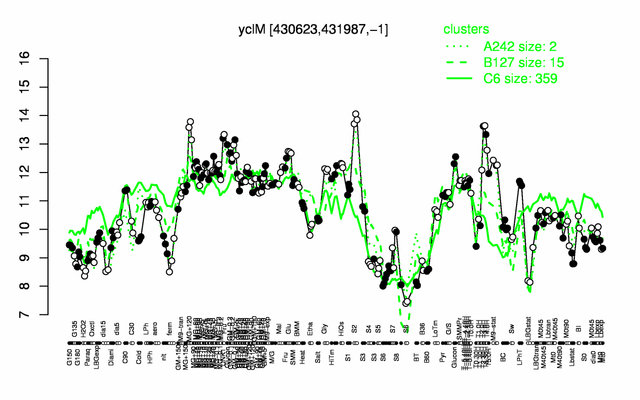YclM
- Description: aspartokinase III
| Gene name | yclM |
| Synonyms | |
| Essential | no |
| Product | aspartokinase III |
| Function | unknown |
| Gene expression levels in SubtiExpress: yclM | |
| Metabolic function and regulation of this protein in SubtiPathways: yclM | |
| MW, pI | 49 kDa, 4.783 |
| Gene length, protein length | 1362 bp, 454 aa |
| Immediate neighbours | yczN, yclN |
| Sequences | Protein DNA DNA_with_flanks |
Genetic context 
This image was kindly provided by SubtiList
| |
Expression at a glance PubMed
| |
Contents
Categories containing this gene/protein
biosynthesis/ acquisition of amino acids
This gene is a member of the following regulons
The gene
Basic information
- Locus tag: BSU03790
Phenotypes of a mutant
Database entries
- BsubCyc: BSU03790
- DBTBS entry: [1]
- SubtiList entry: [2]
Additional information
The protein
Basic information/ Evolution
- Catalyzed reaction/ biological activity: ATP + L-aspartate = ADP + 4-phospho-L-aspartate (according to Swiss-Prot)
- Protein family: aspartokinase family (according to Swiss-Prot)
- Paralogous protein(s):
Extended information on the protein
- Kinetic information:
- Modification:
- Effectors of protein activity: inhibited by the simultaneous presence of threonine and lysine PubMed
Database entries
- BsubCyc: BSU03790
- Structure:
- UniProt: P94417
- KEGG entry: [3]
- E.C. number: 2.7.2.4
Additional information
Expression and regulation
- Operon: yclM PubMed
- Regulation:
- Additional information:
- number of protein molecules per cell (minimal medium with glucose and ammonium): 78 PubMed
Biological materials
- Mutant:
- Expression vector:
- lacZ fusion:
- GFP fusion:
- two-hybrid system:
- Antibody:
Labs working on this gene/protein
Your additional remarks
References
Reviews
Original publications
Boris R Belitsky, Abraham L Sonenshein
Genome-wide identification of Bacillus subtilis CodY-binding sites at single-nucleotide resolution.
Proc Natl Acad Sci U S A: 2013, 110(17);7026-31
[PubMed:23569278]
[WorldCat.org]
[DOI]
(I p)
Pierre Nicolas, Ulrike Mäder, Etienne Dervyn, Tatiana Rochat, Aurélie Leduc, Nathalie Pigeonneau, Elena Bidnenko, Elodie Marchadier, Mark Hoebeke, Stéphane Aymerich, Dörte Becher, Paola Bisicchia, Eric Botella, Olivier Delumeau, Geoff Doherty, Emma L Denham, Mark J Fogg, Vincent Fromion, Anne Goelzer, Annette Hansen, Elisabeth Härtig, Colin R Harwood, Georg Homuth, Hanne Jarmer, Matthieu Jules, Edda Klipp, Ludovic Le Chat, François Lecointe, Peter Lewis, Wolfram Liebermeister, Anika March, Ruben A T Mars, Priyanka Nannapaneni, David Noone, Susanne Pohl, Bernd Rinn, Frank Rügheimer, Praveen K Sappa, Franck Samson, Marc Schaffer, Benno Schwikowski, Leif Steil, Jörg Stülke, Thomas Wiegert, Kevin M Devine, Anthony J Wilkinson, Jan Maarten van Dijl, Michael Hecker, Uwe Völker, Philippe Bessières, Philippe Noirot
Condition-dependent transcriptome reveals high-level regulatory architecture in Bacillus subtilis.
Science: 2012, 335(6072);1103-6
[PubMed:22383849]
[WorldCat.org]
[DOI]
(I p)
N Kobashi, M Nishiyama, H Yamane
Characterization of aspartate kinase III of Bacillus subtilis.
Biosci Biotechnol Biochem: 2001, 65(6);1391-4
[PubMed:11471740]
[WorldCat.org]
[DOI]
(P p)
J J Zhang, F M Hu, N Y Chen, H Paulus
Comparison of the three aspartokinase isozymes in Bacillus subtilis Marburg and 168.
J Bacteriol: 1990, 172(2);701-8
[PubMed:2153658]
[WorldCat.org]
[DOI]
(P p)
L M Graves, R L Switzer
Aspartokinase III, a new isozyme in Bacillus subtilis 168.
J Bacteriol: 1990, 172(1);218-23
[PubMed:2152900]
[WorldCat.org]
[DOI]
(P p)